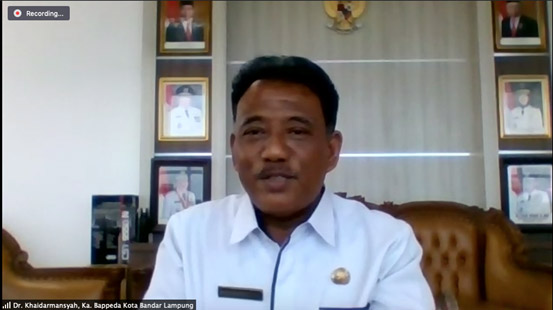UCLG ASPAC pushes through city’s commitment towards climate resilience in inclusive way through Climate Resilient Inclusive Cities (CRIC) Programme. Ten pilot cities in Indonesia have expressed their commitment to the implementation of this five-year initiative (2020-2024) that will build their capacities through various activities. This will further be formalised with City Commitment signed by mayors to play an active role in the adoption and promotion of tools and policies to achieve good governance, sustainable use of resources, social inclusiveness, innovation and technology, resilience and climate action and also triangular cooperation.
Marking city’s commitment to participate in the CRIC Programme is the establishment of City Working Group on Climate Change. Bandar Lampung is the first of ten pilot cities that realises this commitment.
Dr. Khaidarmansyah, the Head of Bandar Lampung City Planning Agency said that the City Working Group is the catalyst for change. “In Bandar Lampung, communities who work in the fishery, agriculture and construction sectors are among the most vulnerable groups. In the context of city working group, we can educate and inform these groups about the impact of climate change. We can advocate for better planning and policies that can improve communities’ resilience. We can work together with them to come up with local solutions to adapt to climate change,” he said via Zoom meeting on Wednesday (26/8).
Based on the focus group discussion held last June, the representative of Bandar Lampung shared that the city seeks to improve air quality, better manage its waste and provide a better access to clean water, housing and infrastructure. To address these, the city has several programmes and activities in the pipeline that include upgrading informal settlements, improving urban drainage system, promoting trees-planting and bio-pores programmes and building waste bank.
“Our mayor is already aware of the urgency to act now to adapt to climate change. With our participation in the CRIC Programme, we expect to build our capacity in planning and building a more sustainable city, that will also refer to Sustainable Development Goals,” said Dr. Khaidarmansyah.
Bandar Lampung’s City Working Group consists of 33 members representing diverse voices of local government, universities, civil society organisations and the media who work together to accelerate climate actions at a city level. The City Working Group unites representatives from governments, universities, NGOs working in urban and environment issues and the media. Government members are those coming from the Regional Planning Agency, Environmental Department, Agriculture Department, Tourism Department, Health Department and Public Library. The role of media in the working group, Dr. Khaidarmansyah said, is important in “bridging climate change information gap between government and local communities.”
Moving forward, Dr. Khaidarmansyah said that the CRIC Programme could help Bandar Lampung prepare itself better when developing a Regional Mid-Term Development Plan. He emphasised that there is a need to integrate mitigation and adaptation plans into the planning and development processes.
Following the commitment of Bandar Lampung in CRIC programme, the city has decided to become the member of UCLG ASPAC in which its membership application was recently approved by the Executive Bureau members on 25 August 2020.
CRIC Programme is a joint commitment of UCLG ASPAC with funding support from the European Union. Ten pilot cities in Indonesia are Bandar Lampung, Cirebon, Mataram, Pangkal Pinang, Pekanbaru, Samarinda and Ternate. These cities will receive capacity building activities as well as knowledge sharing and transfer from cities in Asia and Europe.











